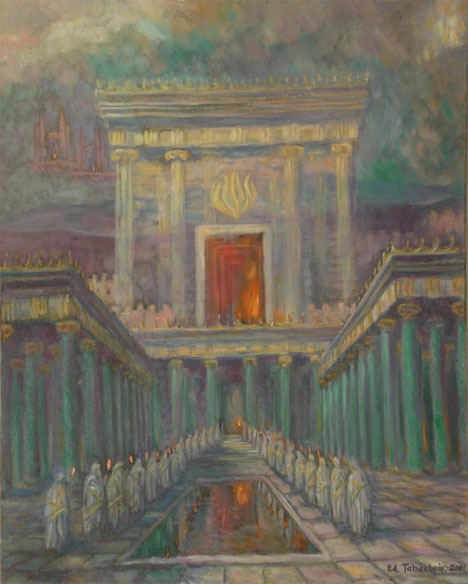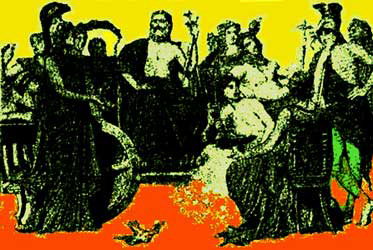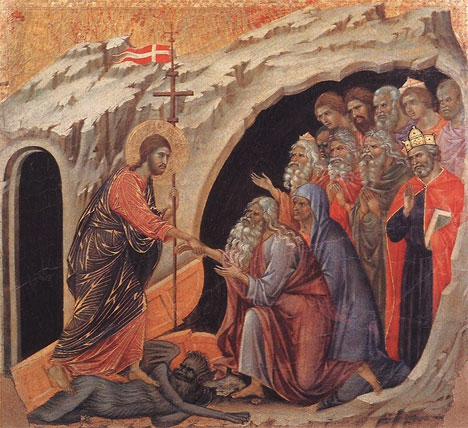May
9
2013
 The first verses of 2 Thessalonians 2 have been an unnecessary battle ground. The Day of the Lord would not come until after the Man of Sin had been revealed. This reasoning seems obvious to Paul. It should be obvious to us if we know the early chapters of Genesis and their corporate expression in Israel’s festal calendar.
The first verses of 2 Thessalonians 2 have been an unnecessary battle ground. The Day of the Lord would not come until after the Man of Sin had been revealed. This reasoning seems obvious to Paul. It should be obvious to us if we know the early chapters of Genesis and their corporate expression in Israel’s festal calendar.
Continue reading
Comments Off | tags: AD70, Covenant Theology, Feasts, Firstfruits, Genesis | posted in Bible Matrix, Biblical Theology, The Last Days
Apr
12
2013
 “And, most heartbreaking, most breathtaking of all, is His willingness to actually become the veil, the flesh that was torn away to reveal the “naked” mind of the Father, the unhidden face of His mission for a bride for His Son.”
“And, most heartbreaking, most breathtaking of all, is His willingness to actually become the veil, the flesh that was torn away to reveal the “naked” mind of the Father, the unhidden face of His mission for a bride for His Son.”
“And the Lord was sorry that he had made man on the earth, and it grieved him to his heart.” (Genesis 6:6)
“But concerning that day and hour no one knows, not even the angels of heaven, nor the Son, but the Father only. For as were the days of Noah, so will be the coming of the Son of Man.” (Matthew 24:36-37)
The relationship between the Father and the Son is an eternal to-and-fro. It is this primary “chiasm,” a “there-and-back-again,” a forming and a filling, which gave shape to the Creation Week and every facet of the Word of God and of human life.
This post has been slain and resurrected for inclusion in my 2015 book of essays, Inquietude.
Continue reading
12 comments | tags: Angels, Flood, Genesis, Marilynne Robinson, Moses, Noah, Open Theism, Tabernacle | posted in Bible Matrix, Biblical Theology
Mar
27
2013

“For thus says the Lord of hosts: ‘Once more (it is a little while) I will shake heaven and earth, the sea and dry land…”
(Haggai 2:6)
Many modern commentators hamstring various parts of the Bible so they don’t run against the grain of modern scientism and historical revisionism. They do this by “classifying” the bits of Scripture that offend modern theory into neat literary genres. “If Genesis is poetry, it can’t be historical,” and other stupidities. Nice try. Another one is “apocalyptic,” a genre which, to the eye of unbelief, might appear to actually exist.
Continue reading
2 comments | tags: Covenant Theology, Genesis, Hermeneutics, James Jordan, Revelation | posted in Biblical Theology, The Last Days
Mar
5
2013
 Were the Nephilim in Genesis 6 angels or aliens?
Were the Nephilim in Genesis 6 angels or aliens?
The Nephilim (“great” or “amazing”) were the first “mighty men” of the Bible. They were the result of the intermarriage between the priestly sons of Seth and the rebellious Cainite kings. The text gives us a split genealogy after the murder of Abel, priests serving God outside the garden, and Cain’s false kingdom (Cain went and built a “fortress” to protect himself). So, humanity was divided into two camps: those who served God as their king and those who rebelled against Him.
Continue reading
17 comments | tags: Cain, Compromise, Genesis, James Jordan, Nephilim | posted in Biblical Theology, Creation, Q&A, The Last Days
Feb
26
2013

“Getting Genesis 1 wrong, capitulating to the worldview and resulting pseudo-science and pseudo-history of darkened minds, will eventually lead you to get Genesis 2 wrong as well.”
[Addendum added below for those who are not familiar with my biblical-theological framework. This post is not really about the complementarian debate. It is about our modern ignorance of biblical structure and process.]
Sydney Anglicans used to have an online forum for discussion of theology. It was a great way to spend a few hours I didn’t have. From those times, two things stick in my mind: the creation/evolution thread that would not die, and one commenter who denied that compromising on a particular controversial issue would lead the compromisers down the proverbial “slippery slope.”
Since I called people names this week, very ungraciously, perhaps it might help if I explained myself a little. I see the interpretation of early Genesis as crucial for our interpretation of the rest of the Bible, but also for our understanding of the world we live in. If a Christian gives in to whatever the prevailing culture demands, there will be ramifications for the rest of his theology. This is because the Bible is fractal in its nature. It is a closely knit network, a carefully constructed grid, just like the created world. To cave on one issue will have outcomes in other areas of theology, and the example I have in mind right now is John Dickson, a brave, educated and wise Christian apologist.
Continue reading
4 comments | tags: Compromise, Genesis, Gnosticism, Hermeneutics, John Dickson | posted in Biblical Theology, Creation
Jan
19
2013

An excerpt from Bible Matrix III:
Just as Esau was the line of Cain rolled into one, so Jacob was a true son of God. In fact, being blameless as Noah was, the Lord granted him a vision of the true Gate of God, a tower reaching to heaven.
In Bible Matrix, we mentioned the significance of Jacob’s “ziggurat” vision as it relates to the mountain of God. [1] Jacob was laid out on the ground like Adam. His slumber brings a “Bridal” vision.
Continue reading
Comments Off | tags: Baptism, Bible Matrix III, Cain, Esau, Genesis, Jacob, Literary Structure, Tabernacle | posted in Bible Matrix, Biblical Theology
Jan
15
2013

“Jacob didn’t steal the future. He rescued it from a Man who put food first and whose eyes were not yet opened.”
James Jordan has done the Church a great service by rehabilitating the reputations of Noah the drunk, Abraham the liar, Jacob the swindler and Moses the murderer. He has shown us that the context of these so-called sins and crimes mean that they are nothing of the sort. [1] By this, I don’t mean “cultural context” but Covenant context. The reason these great men of God (and their wonderful women) get such a bad rap is because their stories are treated like a bunch of separate things that occurred, from which we must draw obvious and disconnected morals, rather than a single narrative begun in Genesis 1.
Continue reading
Comments Off | tags: Abraham, Covenant Theology, Esau, Genesis, Isaac, Jacob, James Jordan, Noah | posted in Bible Matrix, Biblical Theology
Dec
11
2012
 “When Paul had gathered a bundle of sticks and put them on the fire, a viper came out because of the heat and fastened on his hand.” (Acts 28:3)
“When Paul had gathered a bundle of sticks and put them on the fire, a viper came out because of the heat and fastened on his hand.” (Acts 28:3)
One interesting facet of biblical symbols is their identification by “use” and “motion.” Objects that have no link in the natural order of things can be tied together through their use in a similar purpose in the work of the house of God. This is not entirely strange. Diverse things which have no relationship in the natural order are brought together by man for use in “housework.” For the Author of the Bible, nature is “plastic.” This factor is one reason why the Bible is strange to modern ears and minds.
[This post has been refined and included in Sweet Counsel: Essays to Brighten the Eyes.]
Continue reading
2 comments | tags: Exodus, Genesis, Isaiah, Jeremiah, Postmillennialism, Revelation, Revelation 20, Satan | posted in Biblical Theology, The Last Days
Sep
17
2012

“What we have received from Jesus is not a collection of ‘merits,’ but rather His maturity.”
James B. Jordan writes:
The problem with the “covenant of works” notion lies in the fact that it is linked up with merit theology. There is no merit theology in the Bible. Merit theology is a hangover of medieval Roman Catholicism.
Continue reading
7 comments | tags: Covenant Theology, Federal Vision, Genesis, James B. Jordan, Melchizedek, Roman, Roman Catholicism | posted in Biblical Theology, Christian Life, Quotes
Sep
8
2012
or The Architecture of Abraham’s Bosom

“For just as Jonah was three days and three nights in the belly of the great fish, so will the Son of [Adam] be three days and three nights in the heart of the [Land].”
(Matthew 12:40)
There was some to and fro recently between Doug Wilson and Andrew Perriman on the use of Greek terms for the grave and hell used by the New Testament writers. [1] Each makes some very good points (I lean more towards Perriman), concerning “what lies beneath.” When Jesus speaks of a “divided hell,” should we be overly concerned about Greek mythology? It seems to me that those who focus on the references to pagan literature in the Bible fail to see the biblical sources of many things, even if these biblical things pick up Greek names along the way.
However, neither Wilson nor Perriman really deals with the architecture of God’s work in the world, which is what actually lies beneath. As with Shakespeare, an understanding of God’s “global theatre” enlightens us concerning the shape of His stories.
Continue reading
Comments Off | tags: Abraham, AD70, Baptism, Circumcision, Covenant Theology, Genesis, Melchizedek, Moses, Revelation, Solomon, Temple | posted in Bible Matrix, Biblical Theology, Creation, The Last Days
 The first verses of 2 Thessalonians 2 have been an unnecessary battle ground. The Day of the Lord would not come until after the Man of Sin had been revealed. This reasoning seems obvious to Paul. It should be obvious to us if we know the early chapters of Genesis and their corporate expression in Israel’s festal calendar.
The first verses of 2 Thessalonians 2 have been an unnecessary battle ground. The Day of the Lord would not come until after the Man of Sin had been revealed. This reasoning seems obvious to Paul. It should be obvious to us if we know the early chapters of Genesis and their corporate expression in Israel’s festal calendar.

































